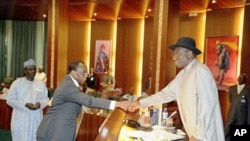Nigeria's acting president says his new Cabinet will improve security in the volatile Niger Delta, where years of violence have reduced Nigerian oil production.
Acting President Goodluck Jonathan says his Cabinet reflects the federal government's commitment to take bold steps to solve the nation's problems.
Chief among them is insecurity in the oil-rich Niger Delta as Mr. Jonathan named a former minister of state as the new Niger Delta minister and chose a new oil minister who is from the Delta.
Just last month, militants set off two bombs outside a meeting in the Delta that was meant to discuss an amnesty program through which thousands of gunmen have laid down their weapons in exchange for monthly payments, clemency, and the promise of employment.
Militants are frustrated with the pace of the program and say the government has not done enough to help people living in the area that generates the bulk of Nigeria's oil wealth.
The Movement for the Emancipation of the Niger Delta claimed responsibility for the bombings in Warri, warning of renewed attacks against Nigeria's oil industry if the government does not move quickly to improve conditions.
Raymond Gilpin, an associate vice president for sustainable economies at the U.S. Institute of Peace, says the Jonathan administration must reconsider its approach to the Niger Delta.
"First and foremost they should pay some attention to the political and socio-economic needs of the communities in the oil states," Gilpin said. "That would go a long way to defuse tensions and would go a long way to reduce the number of people who are involved in and benefit from piracy and oil theft."
Four years of sabotage and killing in the Niger Delta cut Nigeria's oil production by more than one-quarter. That production began to rebound following last year's amnesty program. Mr. Jonathan's challenge is keeping former militants engaged while preventing renewed violence from spreading.
The acting president travels to Washington next week for talks that are expected to include increasing cooperation on Niger Delta security.
When U.S. Secretary of State Hillary Clinton was in Abuja last August, she said Nigerian defense officials made "very promising" specific suggestions about how the U.S. military could help bring peace and stability to the Niger Delta.
The two countries this week renewed a binational commission that Secretary Clinton says will help strengthen their partnership on security and good governance.
"The commission will help us work together on issues of common concern and shared responsibility, and we hope it will support the aspirations of the Nigerian people for a peaceful, prosperous, stable democratic future," Clinton said.
President Umaru Yar'Adua brokered the Niger Delta amnesty plan. And his prolonged medical absence is one of the reasons it has stalled. Acting President Jonathan says he is committed to reviving that momentum to show the people of the Delta that the federal government is serious about improving their lives while protecting the flow of oil.




